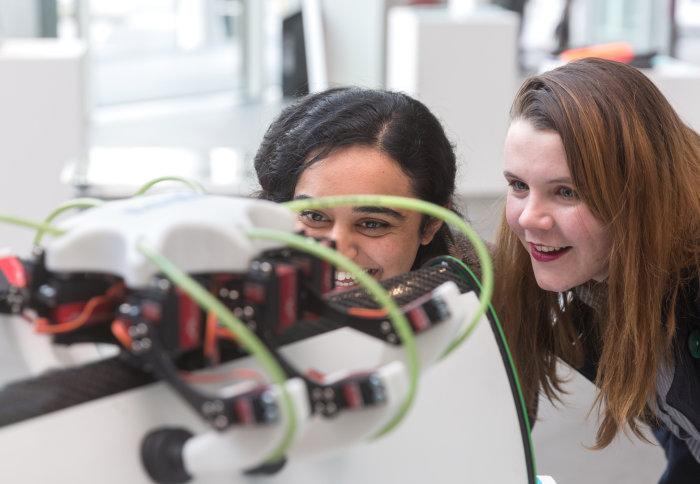Imperial hackers feed graphene to silkworms and spin 'candyfloss plastic'

Imperial’s community of makers and hackers are showcasing their creations as part of Enterprise Week 2018.
Imperial College Advanced Hackspace (ICAH) is a unique community of over 2,500 makers, hackers, inventors and entrepreneurs from across the College.

At the ICAH Demo Days - hosted in the College’s Main Entrance from Monday 19 - Wednesday 21 March (10am - 6pm) - visitors can learn about machinery that can take a hand-sketch and turn it into beautiful embroidery, a fingerpick test that can distinguish between a bacterial or viral infection, and a bug-like robot that can do the dangerous job of inspecting and maintaining wind turbines.
ICAH provides access to specialist manufacturing equipment, training, and a network of like-minded members, to help anyone at the College turn their ideas into real breakthrough prototypes and solutions.
There are hackspaces across the South Kensington Campus, and last year the College opened a bespoke workshop at The Invention Rooms in White City. This new facility, one of the largest of its kind in the world, contains a fully equipped bio-lab, alongside state-of-the-art 3D printing, electronics, metalwork and woodwork equipment.
Polyfloss

Projects on display this week include The Polyfloss Factory, an innovative plastic recycling process inspired by the principle of candy-floss machines.
Created by a team of Innovation Design Engineering Alumni, the Polyfloss machine transforms thermoplastics into a wool, which can then be re-used for insulation, packaging, garments or product design.
Due to its unique properties, Polyfloss is easy to transform, allowing for the design and manufacture of upcycled plastic products without expensive or complicated manufacturing techniques.
Supersilk
Thea Peterson, a postgraduate student from the Dyson School of Design Engineering, is developing an innovative new e-textile made from graphene-infused silk.

Graphene is an atom-thick layer of carbon bonded together in a repeating pattern of hexagons. Known as a ‘super material’, it is one of the thinnest, lightest, strongest and most conductive materials to have been discovered.
The supersilk fabric is created by feeding graphene to silkworms, which then go on to produce silk infused with the material and its properties. The result is a strong, conductive, sustainable material with a range of possible applications.
The conductive nature of the material would allow for integrated circuitry to be woven into fabric. The team are currently looking at using it to create maternity clothing that could incorporate sensors to monitor the mother’s blood pressure, baby movements, and contractions.
3d printed ceramics
Umar Hossain, a postgraduate student from the Department of Mechanical Engineering, has created a ceramic 3D printer.

The device can create functional and beautiful objects with complex and intricate internal structures and surface patterns that would otherwise be unattainable by normal pottery means. These structures can affect the strength, toughness and other mechanical properties of the materials.
The clay is extruded through a nozzle using air pressure, and servo motors control the height and position of the nozzle over the printing surface. After printing the many intricate layers in clay, it can then be finished, biscuit fired and glazed like a normal ceramic object.
Bladebug

Bladebug, created by Imperial alumnus Chris Cieslak and Dr Nicolas Rojas from Imperial’s Dyson School of Design Engineering, is a multi-legged walking robot, designed for the inspection and maintenance of wind turbine blades.
The giant blades on wind turbines are permanently exposed to the elements, meaning that keeping them clean and operative is a constant challenge. But in order to inspect them rope-access technicians have to abseil down the blades, presenting health and safety risks – especially with off-shore turbines.
Bladebug would be able to walk along the blade surface to carry out maintenance and inspections – maximising the lifespan of the blades without the need to humans to undertake risky activities.
Enterprise Week
Imperial’s Enterprise Week 2018 is a week-long showcase of startups, entrepreneurs, and innovators froma accross the College running from 19-23 March.
The week will include exhibits, public events and dragons-den style competitions to shine a light on game changing inventions, vibrant student and research-led start-ups, and transformative new technologies developed by Imperial entrepreneurs.
Find out more about Enterprise Week 2018.
Photo credit (Silkworm) - fuyu liu/Shutterstock.com
Article text (excluding photos or graphics) © Imperial College London.
Photos and graphics subject to third party copyright used with permission or © Imperial College London.
Reporter
Deborah Evanson
Communications Division